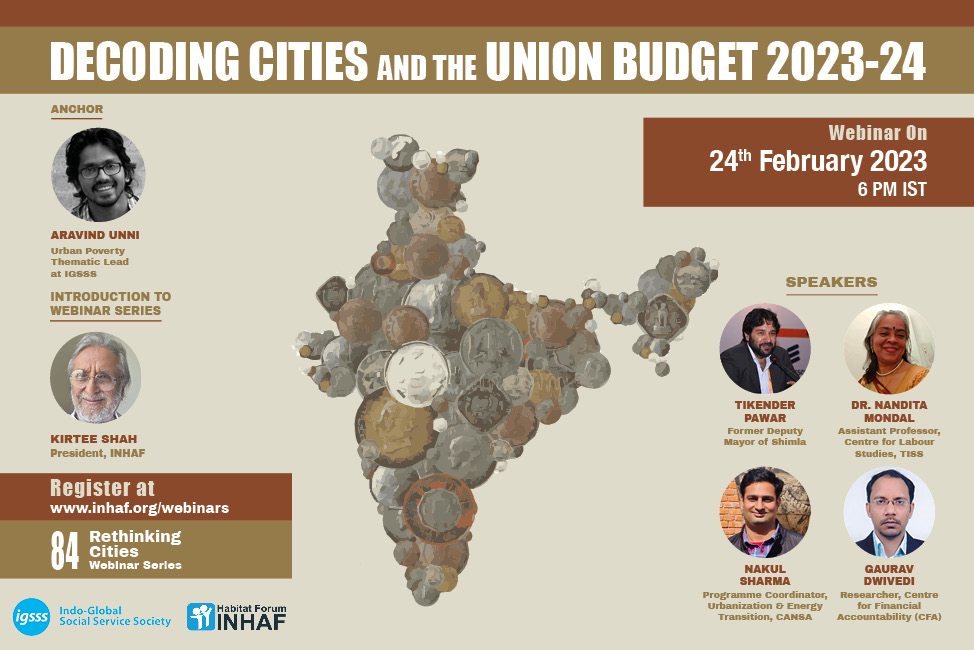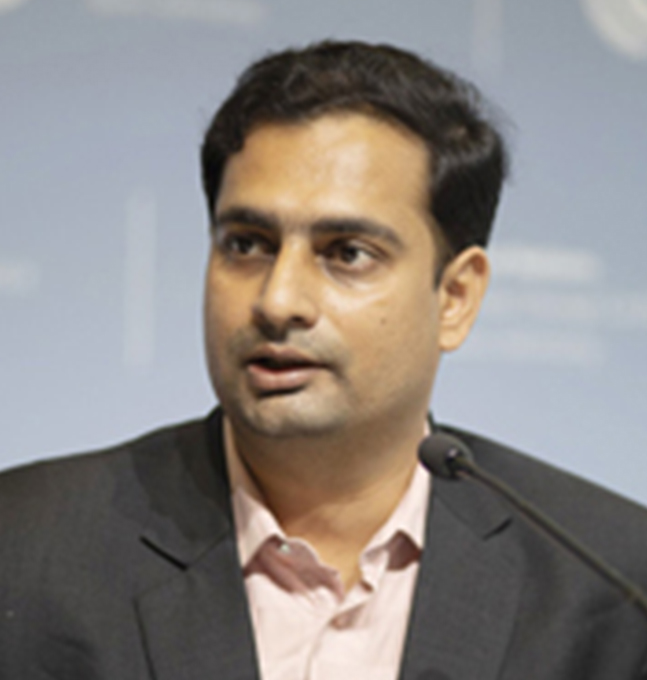
Speakers
-
 Aravind UnniUrban Poverty Thematic Lead, IGSSS
Aravind UnniUrban Poverty Thematic Lead, IGSSSHe is working as Urban Poverty Thematic Lead with Indo-Global Social Service Society, and handling developmental interventions with the most marginalized sections of the urban poor in more than 30 cities spread across 15 states. His core area of interest for research and action on urbanization and its intersection with poverty in cities, and has hands-on experience in working with communities over the last six years in participatory planning, formulating policy recommendations for people’s concerns related to housing and livelihoods, and advocating for equitable and just cities. Aravind Unni has completed his B.Arch from Jamia Millia Islamia, New Delhi and M.S. Arch from University of California- Berkeley, and is currently pursuing his PhD on Urban Social Movements from Tata Institute of Social Sciences in Mumbai.
-
 Gaurav DwivediResearcher, Centre for Financial Accountability (CFA)
Gaurav DwivediResearcher, Centre for Financial Accountability (CFA)Gaurav Dwivedi works with the Centre for Financial Accountability (CFA). He has been researching and documenting privatisation, reforms and public private partnership projects in public services with a focus on water supply, sanitation and sewerage for more than a decade. His work includes several publications on these themes.
-
 Nakul SharmaProgram Coordinator, Urbanization and Energy Transition, CANSA
Nakul SharmaProgram Coordinator, Urbanization and Energy Transition, CANSANakul Sharma is a clean energy enthusiast, working with CANSA on various programs related to capacity building, policy analysis, and advocacy. He provides evidence-based analyses to promote fair, inclusive, and just energy transition in South Asia. His areas of expertise, combined with keen interest, are the promotion of renewable energy and clean energy policy, access to transition and infrastructure finance, and ensuring energy justice in the Global South.
-
 Nandita MondalAssistant Professor, Centre for Labour Studies, TISS
Nandita MondalAssistant Professor, Centre for Labour Studies, TISSDr. Nandita Mondal is an Assistant Professor for Centre for Labour Studies at School of Management and Labour Studies, Tata Institute of Social Sciences (TISS), Mumbai and is a trained Social worker from Visva Bharati, Santiniketan. She has worked on empowerment of Koli fisherwomen in Mumbai for her PhD from the University of Mumbai. She has worked with government, nongovernment, corporate as well as educational institutions during her professional career across India spanning nearly three decades. Her research interest covers the issues of women in informal labour, women’s work and dignity, cooperative governance and women, child labour and corporate social responsibility. She has several refereed publications and numerous professional presentations to her credit.
Local Time
- Timezone: America/New_York
- Date: Feb 24 2023
- Time: 7:30 am - 9:00 am
Decoding Cities and the Union Budget 2023-24
India’s urban trajectory is at an interesting juncture. Whilst awaiting more planned development, Indian cities are also faced with developmental challenges that are unique ranging from sustainability concerns to climate crisis induced hardships that are increasingly visible. The challenges primarily can be categorized as those that are related to poverty and economic inequalities, infrastructural shortfall and gaps, sustainability concerns and future climate threats with resilience needs. To address these challenges, Indian cities need to adopt sustainable and inclusive urban development strategies that prioritize the needs of all citizens, promote efficient use of resources, and minimize environmental impacts.
It is in this context that the urban in union budgets play a crucial role in the economic and social development of the country and direct the policy development for future. The urban also in the last few years has increasingly found more mention and allocations in the union budget, this year at least on the surface was no different. Whilst union budget 2023-24 is well received by industry and mainstream media for increased infrastructure spending with focus on development. The Budget 2023-24 envisions to create sustainable cities of tomorrow, where the states and cities will be encouraged to undertake urban planning reforms and actions to transform our cities into ‘sustainable cities of tomorrow’. The other impetus is to make cities self-reliant, Budget looks to incentivize cities to improve their credit worthiness for municipal bonds and speed the property tax governance reforms. Increased funding of big ticket urban infrastructure projects could be expected through an Urban Infrastructure Development Fund (UIDF) will be established through use of priority sector lending. And another well appreciated focus was on impetus on scientific management of dry and wet waste. But there were also glaring gaps and omissions from tangible programs to address climate resilience needs, urban decentralization of powers and resilience building not in terms of finances, but before those capacities. The urban poor population groups have been given a complete miss, with many schemes and promises made in the previous budgets not even finding mention in the budget speech.
This panel then aims to therefore bring together experts to develop a more nuanced and closer reading of the union budget, not just from the perspective of allocations and mentions, but also the themes that were focused on and missed altogether. A closer reading will also help compare the previous budgets and allocations. Specific attention will be given on aspects like governance, urban climate resilience, housing, transportation, urban poor – workers and so on, wherein sectoral expertise will read in between the lines to explain and decode the budget better. It is also expected that such an attempt will also help in better understanding and utilization of union budget as a better tool for engagement with the state for resource allocation and policy improvements.
